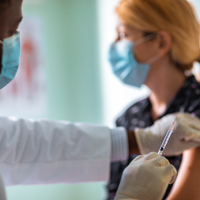Login
Subscribeclinical trials, disease & medicine

Pharma Looks to Inflammasome Inhibitors as All-Around Therapies
Rachael Moeller Gorman | Apr 1, 2021 | 10+ min read
Many major biopharmaceutical companies are developing or acquiring drugs that target the NLRP3 inflammasome, a large intracellular complex that researchers say can spark inflammation and stoke diseases of lifestyle and aging.

CAR Macrophages Tackle Challenges in Solid Cancer Treatment
Amanda Heidt | Mar 26, 2021 | 6 min read
Following on the success of CAR T cells used to treat cancers of the blood, researchers have launched a Phase 1 clinical trial of genetically modified macrophages to target solid tumors.

José Baselga, Renowned Oncologist, Dies at 61
Asher Jones | Mar 22, 2021 | 2 min read
The cancer researcher and executive vice president of AstraZeneca’s oncology research and development is well known for his role in the development of pivotal breast cancer therapies.

Eli Lilly Claims New Drug Can Slow Alzheimer’s-Related Decline
Lisa Winter | Mar 16, 2021 | 2 min read
Patients who received the drug fared better cognitively and functionally than those taking placebo, but still experienced losses in performance.

COVID-19 Vaccine Combos Aim to Boost Immunity
Asher Jones | Mar 9, 2021 | 6 min read
Mix-and-match shots could simplify vaccine rollout and stimulate more-robust immune responses. Ongoing clinical trials will soon give answers.

High Risk of Bias in Early COVID-19 Studies: Meta-Analysis
Max Kozlov | Jan 14, 2021 | 5 min read
Few peer-reviewed clinical papers on the pandemic contained original data, and many of those that did had poor experimental design.

What’s Ahead for SARS-CoV-2 Research in 2021
Shawna Williams | Jan 8, 2021 | 5 min read
From new treatments to an investigation into the virus’s origins, here are some of the developments we can expect this year.

Gene Therapy in One Eye Improves Vision in Both Eyes
Abby Olena, PhD | Dec 11, 2020 | 4 min read
It’s not clear why the patients with Leber hereditary optic neuropathy, a mitochondrial disorder that causes blindness, also experienced the modest benefits in their untreated eye.

Opinion: Emergency Use Authorizations Are a Threat to Science
Kevin J. Tracey and Christina Brennan | Dec 1, 2020 | 4 min read
As COVID-19 therapies get emergency-use green lights, the Biden administration must organize a therapeutic review board to help identify what’s working and what’s not.

Moderna’s COVID-19 Vaccine 94 Percent Effective: Initial Data
Max Kozlov | Nov 16, 2020 | 3 min read
The results mark the second experimental COVID-19 vaccine to show high efficacy, but the study is not complete and the data have not been peer reviewed.

Pfizer’s COVID-19 Vaccine 90 Percent Effective: Initial Data
Max Kozlov | Nov 9, 2020 | 3 min read
Vaccine experts say the results surpass their expectations, but the study is not complete, and the data have not been peer reviewed.

Doctors Consider Convalescent T Cell Therapy for COVID-19
Abby Olena, PhD | Nov 6, 2020 | 3 min read
Researchers propose that an infusion of memory T cells from people who have recovered from SARS-CoV-2 infections could treat severe disease.

Eli Lilly Halts Antibody Trial in Hospitalized COVID-19 Patients
Ashley Yeager | Oct 27, 2020 | 1 min read
Recent data show that the drug bamlanivimab, also known as LY-CoV555, does not appear to help those with severe cases of COVID-19, but trials continue for milder cases.

Johnson & Johnson Pauses COVID-19 Vaccine Trials
Amanda Heidt | Oct 13, 2020 | 3 min read
The company voluntarily paused its studies, including one in Phase 3, after an unexplained illness in a patient.

A Challenge Trial for COVID-19 Would Not Be the First of Its Kind
Jef Akst | Oct 8, 2020 | 9 min read
Although scientists debate the ethics of deliberately infecting volunteers with SARS-CoV-2, plenty of consenting participants have been exposed to all sorts of pathogens in prior trials.

Antibody-Based Drug May Reduce COVID-19 Hospitalizations: Study
Lisa Winter | Sep 17, 2020 | 2 min read
Eli Lilly reports a 72 percent reduction in hospitalization risk among patients who received its monoclonal antibody compared to those who received a placebo.

Indian Study Shows No Survival Benefit of Plasma in COVID-19
Alakananda Dasgupta | Sep 15, 2020 | 5 min read
A randomized controlled trial on the use of convalescent plasma therapy to treat coronavirus infections—the first in the world to be completed—yields disappointing results, but some doctors are not discouraged.

Steroid Drugs Are an Effective Treatment for Severe COVID-19: WHO
Catherine Offord | Sep 3, 2020 | 2 min read
A meta-analysis of seven randomized controlled trials concludes that dexamethasone and other corticosteroids reduce 28-day mortality in seriously ill patients.

New Drug Combo for ALS Slows Decline in Small Clinical Study
Jef Akst | Sep 3, 2020 | 3 min read
After six months, patients with fast-progressing amyotrophic lateral sclerosis who had received the experimental treatment had less loss of function than those who received a placebo.
